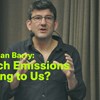blogging
Mark Jaccard: Economic Efficiency vs Political Acceptability Trade-offs in GHG-reduction Policies
Mark Jaccard, Professor in the School of Resource and Environmental Management at Simon Fraser University, VancouverAbstractThere are obvious reasons why for three decades most jurisdictions have failPublic surveys and observation of real-world GHG reduction successes suggest that explicit carbon pricing (carbon tax and perhaps cap-and-trade) can be substantially more politically difficult than certain regulatory policies for shifting the energy system on to a deep decarbonization trajectory. Nonetheless, some people have argued that carbon pricing is an essential GHG reduction policy, suggesting that sincere politicians must do carbon pricing no matter how politically difficult. But the claim that carbon pricing is essential is factually incorrect. Deep decarbonization can be achieved entirely with regulations. Regulatory policies are unlikely to be as economically efficient as carbon pricing. But not all regulations perform identically when it comes to the economic-efficiency criterion. Flexible regulations have some attributes that make them low cost relative to regulations that require adoption of specific technologies.This talk provides evidence that assesses both the relative economic efficiency of policies and their relative political acceptability. The findings reported here suggest that some kinds of flexible regulations can perform significantly better than explicit carbon pricing in terms of relative political cost per tonne reduced while performing only marginally worse in terms of economic cost per tonne reduced. Presumably, this type of trade-off information could be of value to politicians who sincerely want deep decarbonization but would also like to be rewarded with re-election so that they and competing politicians see the value in ambitious and sustained GHG reduction efforts.

Annie Woube
I am an Associate Professor of Ethnology and conduct research on leisure and various forms of self-realization, with a focus on gender constructions, gender equality, and social equality. In my curren
Christian Barry: Which emissions belong to us?
Place:Holländargatan 13, Stockholm, or online.REGISTERAbstractTo address climate change we need to reduce net emissions globally. Most international processes and frameworks have involved seeking to g

Which emissions belong to us?
To address climate change we need to reduce net emissions globally. Most international processes and frameworks have involved seeking to get countries to make cuts to their emissions. Net zero has rec
Living Alone Together: Individualized Collectivism in Swedish Communal Housing
Sociology, first published online,doi.org/10.1177/0038038519834871 Abstract In this study, situated in urban Stockholm, communal housing stands out as highly individualized. The residents positively app
Jonathan Boston: Assessing and Applying the Concept of Anticipatory Governance
Jonathan Boston, Professor of Public Policy, School of Government, Victoria University of Wellington.ABSTRACTFundamental to good governance is the active anticipation, assessment and management of risBased on this analysis, the paper applies the concept to the policy challenges posed by climate change adaptation, particularly sea-level rise. In this regard, humanity is confronted with a slow-motion disaster that will grow progressively in scope and scale, sometimes abruptly. Societies will face significant uncertainty, multiple and compounding risks, immense costs and difficult intertemporal and intragenerational trade-offs. More specifically, rising sea levels will have a major and increasing impact on the built environment in coastal regions. Globally, hundreds of millions of people could be forced this century to relocate from areas at risk from coastal erosion and inundation, higher water tables, and more frequent and intense rainfall events. Mitigating some of the risks and increasing societal resilience via anticipatory, pro-active, prudent and adaptive policy responses will be politically challenging, not least because of the large upfront costs, the likelihood of powerful blocking coalitions, and the complexities of inter-governmental and inter-agency coordination. This paper outlines how, in the interests of sound anticipatory governance, these challenges might be addressed through the creation of new governmental institutions, funding mechanisms and revised planning processes.
“I just want to be the friendly face of national socialism” The turn to civility in the cultural expressions of neo-Nazism in Sweden
in: Nordicom Review, Volume 42: Issue S1This article is based on a case study of the media narratives of the neo-Nazi organisation Nordic Resistance Movement (NRM) and situates this particular actor w
Criminal nomads: The role of multiple memberships in the criminal collaboration network between Hells Angels MC and Bandidos MC
Global Crime vol. 23, no 2 Abstract Outlaw motorcycle gangs (OMGs) have received increased atten-tion from both law enforcement agencies and the research com-munity. This study investigates the criminal
Bashir Bashir: Egalitarian Binationalism for Israel/Palestine.
Venue: Institute for Futures Studies, Holländargatan 13 in Stockholm Research seminar with Bashir Bashir, associate professor of political theory at the Open University of Israel and a senior research
The future of automation
Depending on your perspective, technological development has been saving us from drudgery, or destroying our livelihoods, for centuries. From the very first domestication of animals we’ve been finding








